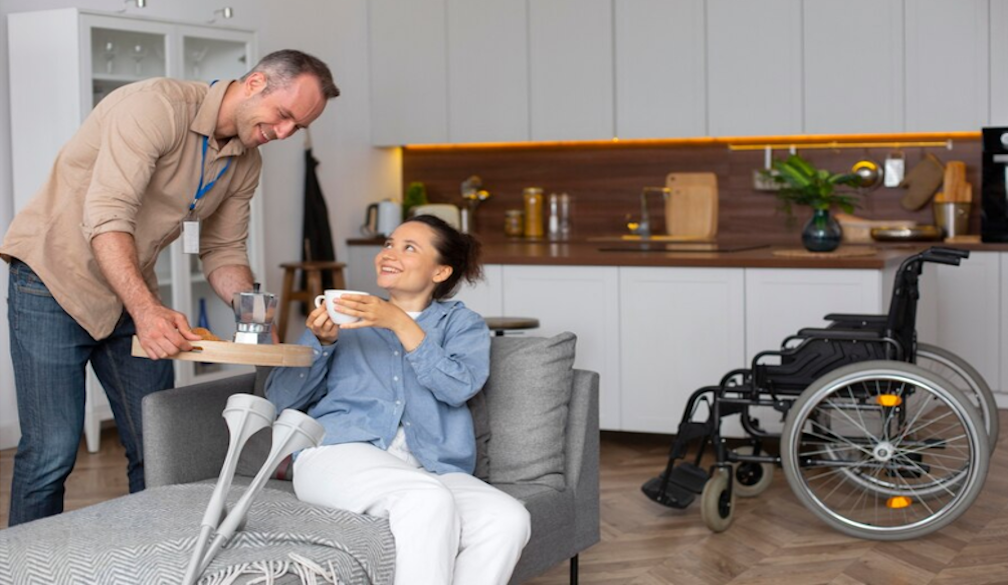Top Benefits of Independent Living for People with Disabilities: Supported by NDIS

People with disabilities must be allowed to live independently to significantly improve their living standards. This will allow them to work independently, make their own choices, achieve character goals, and gain a better reputation for their minorities/subcultures. Indeed, the National Disability Insurance Scheme (NDIS) has significantly altered the lives of people with disabilities.
One aspect of NDIS-supported Independent Living (SIL) is encouraging people to reside in their own houses and communities. This blog explores how SIL greatly improves the lives of people with disabilities.
What is Supported Independent Living (SIL) in the framework of NDIS?
Supported Independent Living under NDIS offers funding for people with disabilities to reside in their homes. This support can come in various forms, including:
- Daily Living Support: Help them with other personal needs for instance, washing, dressing, and making use of the washroom.
- Household Tasks: Some help washing utensils, preparing foods and other domestic work.
- Social and Community Participation: Help with attending social functions, leisure activities, and interactions with other members of society.
- Skill Development: Transition services that include assistance to attain academic, residential, and employment skills.
Key Benefits of NDIS-Supported Independent Living
Increased Independence:
- Personal Choice: People have the freedom to determine how they want to stay, such as where they select to live, who they stay with, and how they spend their unfastened time.
- Development of Skills: With appropriate assistance, people can learn vital life capabilities like cleansing, cooking, and money management, which will allow them to live more freely.
Improved Quality of Life:
- Social Connection: As people reach the age of engaging in independent living statuses, they are likely to make friends and have social relationships to avoid social isolation.
- Enhanced Self-Esteem: Frequently, control over their lives can improve self-esteem and confidence.
- Increased Well-being: Inclusion may help improve health and emotional status since people feel wanted and have a reason to live.
Tailored Support:
- Person-Centred Approach: NDIS-supported independent living is person-centred and customised to meet the person's needs and plan goals, often with the help of expert support coordination sydney services.
- Flexible Support: It may also be modifiable when the requirements of the person with disability alter in future due to disease trajectory.
Cost-Effective:
- Long-Term Benefits: Despite their face-value costs, there is substantial evidence that investments in independent living can yield high long-term savings by reducing the demand for healthcare resources.
- Improved Health Outcomes: This will enable one to have a healthier future free from conditions that would require extensive care and thus improve their quality of life.
Community Integration:
- Active Participation: By participating in social and recreational activities, people can actively contribute to their communities.
- Decreased Stigma: Independent living can help dispel myths and encourage social integration.
Chances of Skills Acquisition and Growth
For clients with disabilities, supported independent living can offer a unique chance to develop and improve themselves in both personal and career aspects.
SIL participants often consult with facilitators to identify personal goals, such as learning a new skill, gaining employment, or exercising regularly. Depending on how the goal is taught, it can be achieved at a person's own pace with further motivation and encouragement. This feeling of achievement can be tremendously inspiring and uplifting at the end of the process.
Supporting Families and Carers: A Service Network
Apart from assisting the individual, SIL supports the family, carers, or attendants.
- Decrease in family burden: This kind of care can be exhausting, and many families cannot afford it, especially when it requires round-the-clock attention. SIL has a reasonable solution that provides families with hope and satisfaction that their loved ones are getting proper care. This relieves the pressure of caregiving from the formal caregivers, thus enabling families to have a wonderful time together.
- Working with Families: Specific SIL services may involve frequent consultation with families to ensure that the support offered aligns with the family's and the beneficiary's preferences. This receives the families' blessings in that they can actively get involved in their loved one's care and share the load with well-experienced caregivers.
Overall Positive Impacts
- SIL empowers people with disabilities to manage their lives, make decisions, and work hard for their wishes and rights. This empowerment is essential to accomplishing actual independence and self-determination.
- Investing in SIL has long-term benefits for people and society. By promoting independence and lowering long-term care costs, SIL complements members' improved quality of life and contributes to a more sustainable support program.
How to Get Supported Independent Living through the NDIS?
Eligibility for the NDIS is a prerequisite for accessing NDIS Supported Independent Living. Following eligibility determination, an NDIS plan is made, which specifies the precise funds and assistance needed. Support coordinators can help people connect with the right service providers and comprehend their NDIS plan.
NDIS-supported independent Living gives people with disabilities the chance to live freely, enabling them to realise their full potential and lead satisfying lives.

